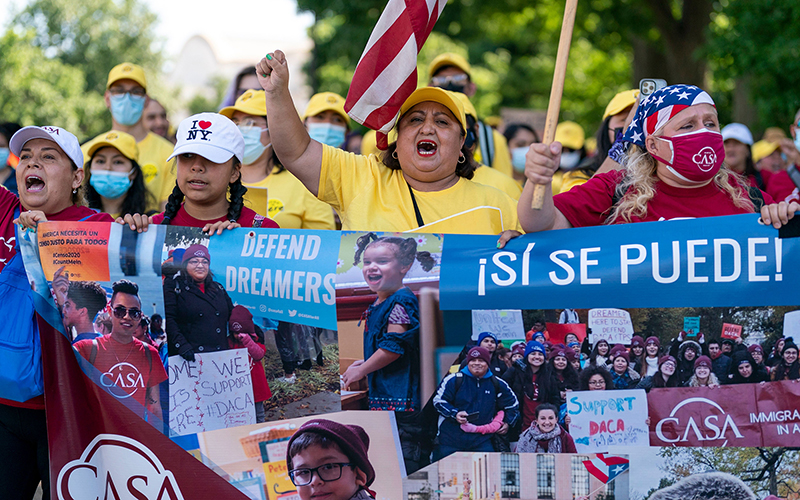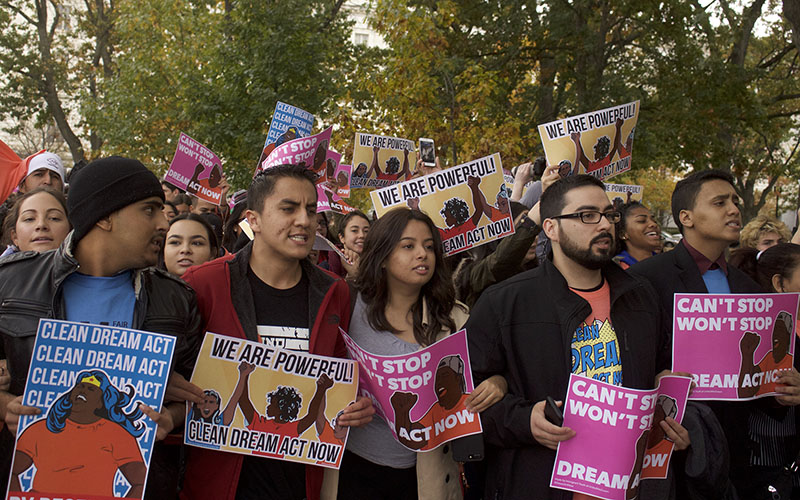
Protesters rally rally in support of DACA, the Deferred Action for Childhood Arrivals program, at the Capitol in June. A federal appeals court vacated the program, but said current recipients could continue to be covered while legal challenges continue. (Photo by J Scott Applewhite/AP/Shutterstock)
WASHINGTON – A federal appeals court ruled Wednesday that DACA, the deferred deportation program for young migrants, was unlawfully created in 2012 but that protection for current DACA recipients can continue for now.
The ruling by a three-judge panel of the 5th U.S. Circuit Court of Appeals is the latest in the 10-year legal odyssey of the Deferred Action for Childhood Arrivals program, and it comes as the Department of Homeland Security unveils new rules it hopes can save the program.
The appeals court ordered a lower court to consider the new DHS rules before making a final decision on DACA. But analysts are not optimistic about the long-term prospects for the program, which covered 594,120 migrants in the U.S. as of June, 22,530 of whom were in Arizona, according to Migration Policy Institute estimates.
“There’s a 100% chance that this district court judge will rule that DACA is illegal,” said David Bier, associate director of immigration studies at the Cato Institute, of District Judge Andrew Hanen, who originally ruled DACA unlawful last summer.
That prospect has advocates renewing calls on Congress to act on long-stalled immigration reform. Karina Ruiz, executive director of Arizona Dream Act Coalition, said that without congressional action, people’s lives could be ruined.
“People are going to lose their jobs, people could be deported, separated from their families,” said Ruiz, a DACA recipient herself. “Our lives are at stake.”
In the meantime, both Hanen and the appellate judges have said undocumented immigrants who are currently protected by DACA can apply for renewal of their status, which lasts two years. People who are not covered by DACA can apply, but DHS is not allowed to process their applications while the legal status of the program is up in the air.
That is frustrating for immigrants like Sarai Dueñez, 17. The Phoenix resident has been waiting more than a year for her DACA application to be considered, while her older brother has had DACA protection for six years.
“I’ve been trying to be patient and wait, because it takes time,” Dueñez said Thursday. “But it’s also frustrating … I’m about to graduate, so it’s really important for me to know what I’m going to do with my future.”
Besides deferring deportation of young migrants it covers, DACA also makes it easier for recipients to get work authorizations, driver’s licenses and enroll in school.
“I was really looking forward to getting a job, and I also want to go to college as well,” Dueñez said. “And it’s a disadvantage when I don’t have the same possibilities and opportunities people from here get.”
DACA was enacted by DHS during the Obama administration, which said it was a policy memorandum outlining the agency’s enforcement priorities. It called for a deferral of deportation for immigrants who were brought to the U.S. as children and who may not have known any other country as home.
Applicants had to have been under age 16 when they came to the U.S. and had to have been here continuously for at least five years before applying. To be accepted, they had to have a clean record, be in school or have a diploma or its equivalent, or have been honorably discharged from the military, among other requirements.
The program was immediately attacked by critics who accused the president of overstepping his authority and usurping Congress. When then-President Donald Trump tried to end the program, he was blocked by courts that said his administration failed to observe the “notice and comment” rules required for such a sweeping change in a public program.
It was the same reasoning that Hanen applied last year, when he ruled that the original implementation of DACA violated the Administrative Procedure Act. The appellate court agreed Wednesday, saying DACA was a “substantive rule” subject to the APA and not the mere policy statement the Obama administration claimed.
“DACA created a detailed, streamlined process for granting enormously significant, predefined benefits to over 800,000 people,” said the ruling by Chief Judge Priscilla Richman. “Because DACA did not undergo notice and comment, it violates the procedural requirements of the APA.”
When President Joe Biden took office, he ordered DHS to start the review process for DACA anew. That culminated in a final rule that was unveiled in August and is set to take effect on Oct. 31.
While the circuit court ordered Hanen to review the final rule, experts anticipate it will suffer the same fate as other immigration programs that “have gone to … Texas to die.”
“I think it’s very likely that DACA will survive 2023, but after that … it comes down to what the Supreme Court wants to do, and I think it’s extremely unlikely given the makeup of the court that DACA will survive the Supreme Court challenge,” Bier said.
Congress could act to permanently protect young undocumented immigrants, but Bier said he’s “pretty pessimistic” that will happen.
“Nothing has moved the needle for Congress to come together and say, ‘Let’s get this done.'” he said.
Congress has been trying since 2001 to pass a DREAM Act, which would provide a pathway to citizenship for current DACA recipients and those otherwise eligible. Over the last 20 years, at least 11 different versions of the bill have been introduced, but none have become law.
Jorge Loweree, managing director of programs and strategy at the American Immigration Council, said that lawmakers need to treat the court’s decision like the crisis it is before DACA is dead.
“If Congress doesn’t act in that window, it’s unclear when the next window will open up,” Loweree said.
While they expressed relief that the appeals court did not strike down DACA outright, advocates said it is difficult to keep their hopes up.
“We bought some time through this decision, however knowing Judge Hanen, and knowing that it is going back to him, doesn’t give us much certainty,” Ruiz said.
Ruiz, whose children were born in the United States, said the end of DACA would hurt more than just herself.
“I would have the fear of being separated from them,” she said. “That’s a reality.”




